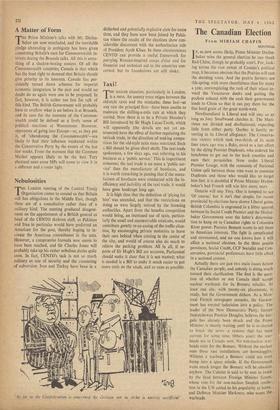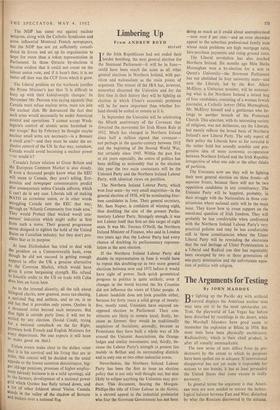The Canadian Election
From MIRIAM CHAPIN F, as now seems likely, Prime Minister Diefen- I y baker wins the general election he can thank Red China, though he probably won't. For, look- ing across the vast extent of Canada's political map, it becomes obvious that the Prairies will cast the deciding votes. And the prairie farmers are this spring, with more cheerfulness than for many a year, contemplating the rush of their wheat to- ward the Vancouver docks and patting the pockets solaced with the cash their government lends to China so that it can pay them for the fine hard grain of the great north-west.
Newfoundland is Liberal and will stay so as long as Joey Smallwood clutches it. The Mari- times are divided and disillusioned, expecting little from either party. Quebec is hastily re- verting to its Liberal allegiance. The Conserva- tive victory which took two-thirds of its seats four years ago was a fluke, owed to a last effort by the dying Premier Duplessis, who ordered his henchmen to get out in the back counties and earn their perquisites. Now under Liberal Premier Lesage, with the remnants of National Union split between those who want to canonise Duplessis and those who would like to forget him fast, it is doubtful if Prime Minister Diefen- baker's bad French will win him many seats. Ontario will stay Tory. One is tempted to say 'Of course,' but it isn't that simple, for recent provincial by-elections have shown Liberal gains. British Columbia is engrossed in a bitter quarrel between its Social Credit Premier and the Diefen- baker Government over the latter's determina- tion to hang on to Canadian rights to Columbia River power. Premier Bennett wants to sell them to American interests. The fight is complicated and envenomed, and no one knows how it will affect a national election. In the three prairie provinces, Social Credit, CCF Socialist and Con- servative, provincial preferences have little effect in a national contest.
Actually there are just two main issues before the Canadian people, and nobody is doing much toward their clarification. The first is the ques- tion of whether or not Canada shall accept nuclear warheads for its Bomarc missiles. At least one site, with twenty-six placements, is ready, but the Government dithers. As a Mon- treal French newspaper remarks, the Govern- ment has erected indecision into a policy. The leader of the New Democratic Party, former Saskatchewan Premier Douglas, believes the bar- gain has already been struck and the Prime Minister, is merely waiting until he is re-elected to break the news--a rumour that has been current for some time. Others assert the war- heads are in Canada now. No non-nuclear war- heads exist for the Bomarc. Without the nuclear ones these vast installations are boondoggles. Without a warhead a Bomarc could not even bump into a space ,missile. If the Government waits much longer the Bomarc will be, obsolete. anyhow. The Cabinet is said to be rent in twain by the feud between Foreign Minister Green, whose vote for the non-nuclear Swedish resolu- tion in the UN added to his popularity at home. and Defence Minister Harkness, who wants the warheads. The NDP has come out against nuclear weapons, along with the Catholic Syndicates and some influential Montreal French newspapers, but the NDP has not yet sufficiently consoli- dated its forces and set up its organisation to hope for more than a token representation in Parliament. In those Ontario by-elections it became evident that it could not count on the labour union vote, and if it hasn't that, it is no better off than was the CCF from which it grew.
The Liberal position on the warheads justifies the Prime Minister's jeer that 'it is difficult to keep up with their kaleidoscopic changes.' In November Mr. Pearson was saying squarely that Canada must refuse nuclear arms, must not join the nuclear club. He denounced the fact that such arms would necessarily be under American control and operations. `I cannot accept Wash- ington's control of atomic arms furnished to our troops.' But by February he thought maybe nuclear small arms are necessary—is a Bomarc a small arM7—and they must be under the ex- clusive control of the US. In that way, somehow, Canada would avoid becoming a nuclear power —or would it?
Canada's future relation to Great Britain and the European Common Market is also cloudy. If even a thousand people know what the EEC Will mean to Canada, they aren't telling. Eco- nomists and newspaper commentators predict dire consequences unless Canada adheres, which it can't do in any case. Liberals talk of making NATO an economic union, or in other words smuggling Canada into the EEC that way, through an 'Atlantic Community free trade area.' They would Protect (that wicked word) con- sumers' industries which might suffer at first from such a move. Their general programme seems designed to tighten the hold of the United States on Canadian industry, but they don't pro- claim that as its purpose.
At least Diefenbaker has tried to deal with the problem on a Commonwealth basis, even though he did not succeed in getting enough support to offer the UK a genuine alternative to the Common Market, which would have given it some bargaining strength. His refusal to knuckle under to the US on trade with Cuba does him no harm here.
As to the internal disunity, all the talk about bilingual checks, now granted, more tax-sharing, a national flag and anthem, and so on, is so old hat that it provokes only yawns. Quebec is a thousand miles beyond such measures. But that fight is outside party lines; it will not be settled by 'any election. (Social Credit, trying for a national comeback on the far Right, promises both French and English Ministers for every department. No one expects it will have in make good on that.) Unless events make clear to the dullest voter that it is his survival and his living that are at stake, this contest will be decided on the usual appeals to the lowest common denominator, big- ger old-age pensions, promises of higher employ- Ment (already business is in a mild upswing), aid to the farmers, development of a national power grid which Quebec has flatly turned down, and a lot of other folderol about Vision. Canada Stands in the valley of the shadow of Bomarc and bickers over a national flag.







































 Previous page
Previous page